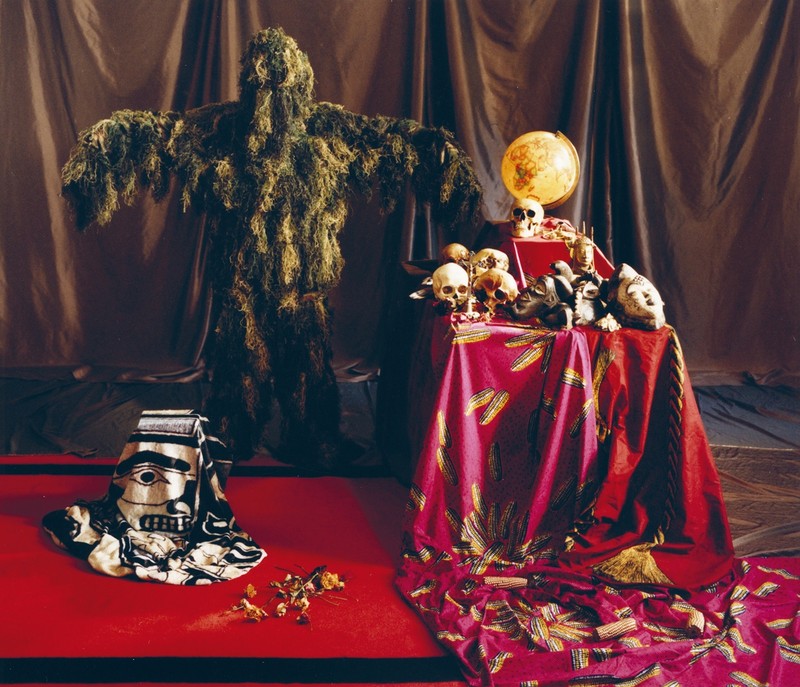Boundary Objects
04 Nov 2015 - 28 Feb 2016
BOUNDARY OBJECTS
4 November 2015 — 28 February 2016
Curator Sophie Goltz
The showcases of the Ethnological Museum are shattered. Current debates in discourse among museums and in contemporary art are focusing on the future of European, African and Latin-American collections whose historical origins are directly tied to colonial geographies and ethnographies. In the light of the historical situation—the racist practice of colonial and world exhibitions, human zoos, medical-historical collections to classify humans—questions related to the restitution of artifacts, the repatriotization of human remains and the power of cultural heritage are attaining significance in international (museums) politics. With the exhibition Boundary Objects in Madrid, the research and exhibition project Artificial Facts (2014/2015) opens after the exhibition in Dresden, which followed after Activations in Cape Town (South Africa), Porto-Novo (Benin) and Dresden (Germany). New commissions for the exhibition and other selected works by international artists pose a challenge to the visual colonization of the museal gaze, examining established visual regimes and calling the gestures of displays and representation—and ultimately the construction of the “other” in the museum—into question. The artists are interested in the future status of objects that were once collected as pieces of cultural-historical evidence, as souvenirs and trophies, and are today increasingly attributed to a globalized World Art. Spotlights and pedestals are now replacing the showcases once used to display artifacts.
Applying the term ‘Boundary Objects’, the exhibition focuses on the potential of objects to transcend established contexts and meanings: as opponents of their own history, the objects become mediators for larger contexts of a shared commemoration of the violence of unethical collecting, which filled the European museums of the 19th and early 20th century, and for the necessity of new creations of transcultural narrations.
Artificial Facts is a transnational exhibition and research project of Kunsthaus Dresden – Municipal Gallery for Contemporary Art (Artistic Director: Christiane Mennicke-Schwarz, project team: Bettina Lehmann, Tobias Mörike) with the artist group Artefakte // aktivierung (Brigitta Kuster, Regina Sarreiter, Dierk Schmidt) and the curator Sophie Goltz, in collaboration with the partners Burning Museum in Cape Town (ZA), the École du Patrimoine Africain in Porto-Novo (BJ) and the University Abomey-Calavi in Cotonou (BJ).
The project is supported by the TURN Fund of the German Federal Cultural Foundation and IFA (Institute for Foreign Relations).
ARTISTS
Asunción Molinos Gordo, Burning Museum, Dierk Schmidt, Emma Wolukau-Wanambwa , Jorge Satorre, Kader Attia, Lisl Ponger, Mariana Castillo Deball, Michelle Monareng, Paulo Nazareth, Peju Layiwola, Penny Siopis, Regina José Galindo y Sammy Baloji and Lazara Rosell Albear.
4 November 2015 — 28 February 2016
Curator Sophie Goltz
The showcases of the Ethnological Museum are shattered. Current debates in discourse among museums and in contemporary art are focusing on the future of European, African and Latin-American collections whose historical origins are directly tied to colonial geographies and ethnographies. In the light of the historical situation—the racist practice of colonial and world exhibitions, human zoos, medical-historical collections to classify humans—questions related to the restitution of artifacts, the repatriotization of human remains and the power of cultural heritage are attaining significance in international (museums) politics. With the exhibition Boundary Objects in Madrid, the research and exhibition project Artificial Facts (2014/2015) opens after the exhibition in Dresden, which followed after Activations in Cape Town (South Africa), Porto-Novo (Benin) and Dresden (Germany). New commissions for the exhibition and other selected works by international artists pose a challenge to the visual colonization of the museal gaze, examining established visual regimes and calling the gestures of displays and representation—and ultimately the construction of the “other” in the museum—into question. The artists are interested in the future status of objects that were once collected as pieces of cultural-historical evidence, as souvenirs and trophies, and are today increasingly attributed to a globalized World Art. Spotlights and pedestals are now replacing the showcases once used to display artifacts.
Applying the term ‘Boundary Objects’, the exhibition focuses on the potential of objects to transcend established contexts and meanings: as opponents of their own history, the objects become mediators for larger contexts of a shared commemoration of the violence of unethical collecting, which filled the European museums of the 19th and early 20th century, and for the necessity of new creations of transcultural narrations.
Artificial Facts is a transnational exhibition and research project of Kunsthaus Dresden – Municipal Gallery for Contemporary Art (Artistic Director: Christiane Mennicke-Schwarz, project team: Bettina Lehmann, Tobias Mörike) with the artist group Artefakte // aktivierung (Brigitta Kuster, Regina Sarreiter, Dierk Schmidt) and the curator Sophie Goltz, in collaboration with the partners Burning Museum in Cape Town (ZA), the École du Patrimoine Africain in Porto-Novo (BJ) and the University Abomey-Calavi in Cotonou (BJ).
The project is supported by the TURN Fund of the German Federal Cultural Foundation and IFA (Institute for Foreign Relations).
ARTISTS
Asunción Molinos Gordo, Burning Museum, Dierk Schmidt, Emma Wolukau-Wanambwa , Jorge Satorre, Kader Attia, Lisl Ponger, Mariana Castillo Deball, Michelle Monareng, Paulo Nazareth, Peju Layiwola, Penny Siopis, Regina José Galindo y Sammy Baloji and Lazara Rosell Albear.

